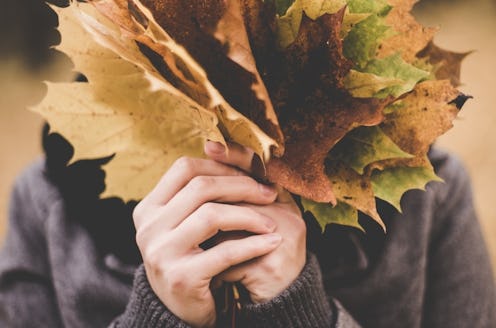
Fall is a glorious time to be alive. After a long, hot summer, there's nothing better than slipping into a comfy sweater, prancing around in leather boots, and partaking in all things pumpkin. But these autumnal delights also mean dealing with your fall allergies, and it can really put a damper on things.
While you so desperately want to go outside and crunch through the leaves, or forsake the A/C in favor of open windows, it all comes with a price — namely a runny nose, scratchy throat, and watery eyes. These fall allergy symptoms can feel like a perpetual sickness, and one that is particularly gross.
So, what's exactly going out there to make these symptoms flare up? "The reason why they are so bad is that in addition to the regular year round allergens, there is a peak of ragweed pollen between late August and the first frost," said Dr. Purvi Parikh M.D., an allergist/immunologist with Allergy & Asthma Network, in an email to Bustle. "This pollen is responsible for many fall allergy symptoms."
While there's not much you can do about the pollen, there are steps you can take to reign in your symptoms. Read on for ways to make your allergies a little less horrible, so you can get back to enjoying the season.
1. Be All About Those Preventative Measures
If you always feel crappy in the fall, then plan ahead to control your symptoms before they start. "Preventative and proactive action plans are always best," Parikh says. "We recommend getting on allergy and asthma medications at the start of the season rather than waiting until symptoms are full blown." So get thyself to an allergist, ASAP.
2. Get Yourself A Neti Pot
When pollen makes its way up your nose, it can cling to your sinuses and cause all sorts of problems. One way to help the issue is to wash it away with some good, old-fashioned nasal irrigation. "Some research has found that using a neti pot can clear nasal passages without dryness or 'rebound' congestion," noted health writer Marisa Cohen on Prevention. It may take some getting used to, but it's definitely worth a try.
3. Keep Windows Closed In The A.M.
I know... it's no longer 5,000 degrees outside, and you'd really like to let the breezes in. But leaving your windows open allows that pollen to gather in your house, and it can make symptoms worse. "We recommend ... keeping windows closed, especially during high pollen times in the morning," Parikh says. It may not be ideal, but your nose will thank you.
4. Resist The Urge To Go Outside
Get in the habit of checking the pollen levels each morning. "If your area is designated a high pollen zone, it’s best to avoid going outdoors," said health expert Wyatt Myers on EverydayHealth.com. You can still go to the park and frolic through corn mazes — just not on these super pollen-y days.
5. Get Your Shower On
If you aren't in the habit of showering before bed, it may be time you change your ways. As Parikh says, "Showering and washing hair and skin before bedtime will reduce your contact with the allergen, especially while sleeping." So rinse off that ragweed, and hopefully you'll wake up feeling a little less stuffy.
6. Always Have Antihistamines On Hand
Of course you should talk with your doctor before popping any pills, but do consider the wonders that are antihistamines. "Many over-the-counter allergy drugs are now non-drowsy, long-lasting, and effective," said Myers. So you can be deal with the itchiness, without drifting off to sleep at work.
7. Set Up An Air Purification System
If your nose is stuffy beyond measure, make it a point to clear your home of as many allergens as possible. "If you have a pet allergy or mold allergy, air purifiers can help reduce exposure," Parikh says. "Unfortunately, this does not help for pollens, but reducing overall allergen exposure will help in general during peak pollen seasons."
8. Fight Off Dust Mites
In the same vein, it can help to get your dust mite exposure under control. To do this, Parikh suggests picking up some dust mite covers for your mattress, pillows, and box springs. They can be kinda pricey, but the benefits will be worth it.
9. Go Hang Out At The Beach
If you live near the coast, consider yourself lucky. "Humid beaches can be problematic for mold-allergy sufferers, but they can make a welcome respite for the ragweed-allergic, as the humidity levels generally keep pollen counts to a minimum," noted lifestyle writer Emily Main in Women's Health. It might just be the perfect, allergy-free weekend trip.
10. Don't Dry Clothes Outside
While it's super cool that you hang dry your clothes, it may not be a good choice during allergy seasons. Pollen can stick to sheets and towels, according to an article on the health website MayoClinic.org. And the same obviously goes for your clothes. So go ahead and fire up the dryer until allergy season is over.
11. Give Acupuncture A Try
Are you down for some alternative treatments? If so, acupuncture may be right up your alley. There's some evidence it can help with seasonal allergies, according to the Mayo Clinic. Who knows? It could be your new go-to system of relief.
In fact, anything you can do to lessen your allergies will be totally worth it. Before long, the worst of the season will be over, and you'll be back to prancing around in sweaters. I promise.
Images: Pexels (12)